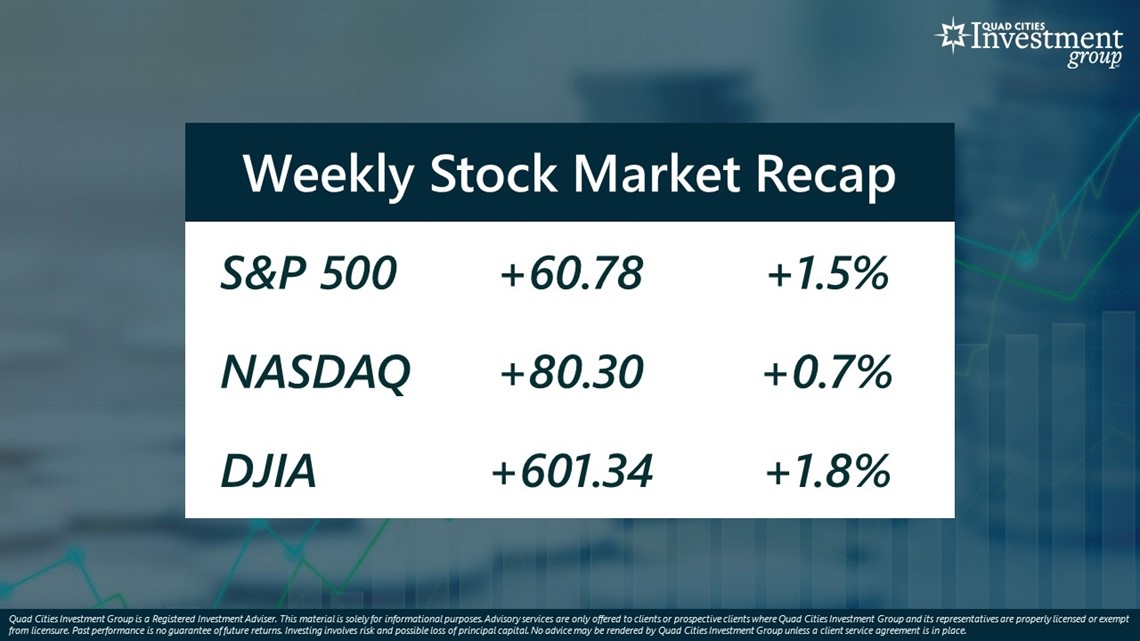MOLINE, Ill. — Over the last week, the benchmark S&P 500 stock index rose 1.5%, NASDAQ rose 0.7% and DJIA rose 1.8%.
Mark Grywacheski with the Quad Cities Investment Group joined WQAD's Ann Sterling to discuss the consumer trends we're seeing as the Thanksgiving holiday shopping weekend comes to a close.


According to the National Retail Federation, an estimated 166.3 million Americans are expected to shop this Thanksgiving Holiday Weekend. The five-day shopping weekend started on Thursday and ends with today’s Cyber Monday shopping event. More than 69% of all holiday shoppers plan to shop over the Thanksgiving weekend this year.
Sterling: With inflation playing such a critical role in this year’s holiday season, what is some of the initial feedback we’re hearing from retailers so far?
Grywacheski: Going into this five-day Thanksgiving shopping weekend the initial sales estimates have been a bit soft. Big-name retailers like Target, Macy’s, Kohl’s and Nordstrom have all commented on lighter-than-expected sales. With inflation as high as it is, heavily discounted sales and promotions are playing a larger role in attracting consumer dollars.
Now, on one hand, that’s good for consumers. But on the other hand, retailers are also being impacted by inflation in higher costs of materials, labor and overhead. And by being forced to offer these steep discounts, any sales don’t leave a lot of profit to be made by the retailer.
Sterling : The five-day Thanksgiving holiday weekend is by far the biggest component of the November-December holiday shopping season. Do you view this weekend as a “make-or-break” time for retailers given the relative softness in sales so far this holiday season?
Grywacheski: Given that sales so far have been a bit underwhelming, this is a critical weekend for the retail industry. But even we see some solid sales numbers for this five-day Thanksgiving shopping weekend, which includes Black Friday and Cyber Monday. We need to see some carryover into December.
Back in 2018, we had this initial surge in retail sales during the Black Friday and Cyber Monday shopping days. But, unfortunately, holiday sales then quickly fell off a cliff. And this conveyed that consumers were willing to spend money, but only on heavily discounted prices. And for retailers, there’s just not a lot of profits when the bulk of your sales come from heavily discounted goods and services. So, hopefully, any success from this five-day shopping weekend continues throughout the entire holiday shopping season.
Sterling : We tend to focus a lot on the larger, national retail stores like Walmart, Target and Amazon. But how are the smaller, local retailers expected to fare this holiday season?
Grywacheski: On the plus side, now that many of the pandemic-related concerns are behind us, experts are projecting a return to a much heavier volume of foot traffic to physical, brick-and-mortar stores. And that’s a good thing. I’ve always been a big supporter of your local community retailers.
But the challenge for smaller retailers in this environment of high inflation is that consumers are very sensitive to prices. And smaller retailers often have a very hard time trying to compete with the likes of Amazon and the big-box retailers on pricing alone. They lack the capital, resources and economies of scale to match the lower prices typically offered by these national retailers.
Watch more news, weather and sports on News 8's YouTube channel

